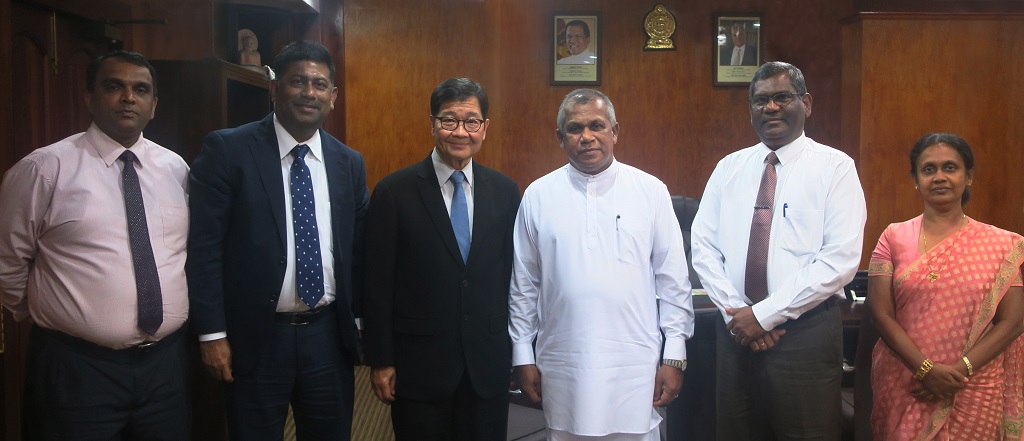
Select Page
During a visit to Sri Lanka on 12 and 13 March 2018, Asian Productivity Organization (APO) Secretary-General Santhi Kanoktanaporn’s schedule was full. Meetings were held with Minister of Public Administration & Management R.M. Ranjith Madduma Bandara; Secretary to the President Austin Fernardo; Secretary, Ministry of Public Administration & Management, and APO Director for Sri Lanka J.J. Rathnasiri; Additional Secretary, Ministry of Public Administration and Management, and Alternate APO Director for Sri Lanka Pradeepa Serasinghe; NPO Head Suranga Gunarathne; and officers of the National Productivity Secretariat (NPS). APO Secretariat Agriculture Department Program Officer Dr. Shaikh Tanveer Hossain accompanied the Secretary-General during the two-day visit.

(L-R) National Productivity Secretariat Director and NPO Head for Sri Lanka W.M.D. Suranga Gunarathne, APO Secretariat Agriculture Department Program Officer Dr. Sheikh Tanveer Hossain, APO Secretary-General Santhi Kanoktanaporn, Minister of Public Administration & Management R.M. Ranjith Madduma Bandara, Ministry of Public Administration & Management Secretary and APO Director for Sri Lanka J. J. Rathnasiri, and Ministry of Public Administration and Management Additional Secretary and APO Alternate Director for Sri Lanka P.G.D. Pradeepa Serasinghe, Colombo, 12 March 2018.
While conferring with Minister Bandara, Secretary-General Santhi offered APO support in the development of Sri Lanka’s new National Productivity Master Plan and Productivity Policy to succeed the 2002 version. He also outlined new Secretariat initiatives, including the Specific National Program tailored to member countries’ current productivity needs and the future strategic plan for meeting the goals under the APO Roadmap to Achieve Vision 2020. Minister Bandara appreciated the offer of support and suggested that the master plan and policy be updated with the collaboration of local experts.
Minister Bandara praised the APO’s proactive role in supporting higher productivity and gave details on Sri Lankan government efforts to raise it in agriculture, still a dominant sector in the country. The Secretary-General then noted the importance of smart agriculture, digital farming, precision agriculture, and future food and how these could address issues like aging farmers, attracting the young to the sector, climate change, and food security.
During the meeting with Secretary to the President Fernando, Secretary-General Santhi gave updates on the APO, Turkey’s membership process, the Pakistan Productivity and Quality Initiative, and development of the Future Strategy Center. Secretary Fernando wanted to know how the APO and NPS could collaborate more closely for national productivity improvement. He hoped for the inclusion of local stakeholders’ opinions during the drafting of the national strategic plan and for interlinkages covering all socioeconomic sectors, pointing out that a continuation of progress and strategy deployment was the key to political commitment. Productivity increases should start at the grassroots level, Secretary Fernando stressed, with farmers introduced to appropriate technology and integrated agricultural systems. He cited the Amul Dairy Cooperative in India and Grameen Bank in Bangladesh as examples of how making agriculture more productive contributed to overall national growth. Secretary-General Santhi commented on the aging and succession problems in Asian agriculture, how digital technology applications could attract the younger generation to farming, and the APO’s new smart farm kit.
The joint discussion with Ministry of Public Administration & Management Secretary and APO Director Rathnasiri and Additional Secretary and Alternate APO Director Serasinghe focused on how the APO could cooperate with the NPS in boosting national productivity. After the ongoing transformations of APO projects and activities were explained by Secretary-General Santhi, Secretary Rathnasiri was in agreement with the need for a new APO business model and believed that similar elements could be incorporated in the updated Sri Lankan National Productivity Master Plan. Stating that the Secretariat should function as a think tank while NPOs act as implementation and training agencies, the Secretary-General referred to the Singaporean experience in achieving rapid improvements in production processes and hoped that other member countries could learn from it.
After Secretary Rathnasiri described several government-sponsored community development activities, Secretary-General Santhi had the opportunity to tour a kaizen project in Gampaha district. Upon learning about its various activities and successful entrepreneurial efforts, he declared the project “amazing” and worthy of wide-scale replication, hoping that other NPOs would launch similar schemes to introduce SMEs to the four phases of “implemental innovation, breaks to innovation, new ventures, and business model innovation.”
The main topics addressed by Secretary-General Santhi during a call on the NPS office and discussions with the staff were “sustainable productivity as the new frontier for productivity, the importance of productivity measurement and monitoring, the sustainable productivity index, and external and internal challenges facing the APO as well as possible ways to address them.” He appreciated NPS activities for nationwide productivity improvement and assured the staff of APO support and cooperation as and when necessary.